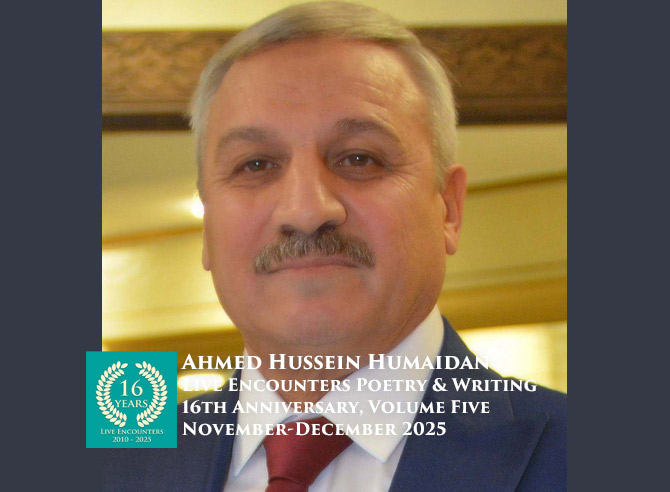
Live Encounters Arab Poetry & Writing 16th Anniversary Volume Five
November- December 2025
The Address of Our Neighborhood, story by Ahmed Hussein Humaidan.
Translated from Arabic by Dr. Salwa Gouda
Whenever we give our house address to any relative or friend visiting us for the first time, we always make sure to mention Dr. al-Shatir’s sign, because it’s fixed at the beginning of the street leading to our neighborhood. We never forget to mention the doctor’s full name (Najdat Muhammad Ali al-Shatir). No sooner do we finish mentioning the title “al-Shatir” at the end of his name than some of them jokingly remark: “You’ve chosen to live in al ‘Shater’ neighborhood, just like its doctor, and we will be ‘Shaterin’ and won’t get lost on our way to you.” We would laugh, humoring their joke. Most of them thought that “al-Shatir” was the doctor’s actual family name, but it was not.
The people of our neighborhood called him “al-Shatir” (the Clever/Excellent One) because of his outstanding academic success every year, even though polio had struck him early and confined him to crutches since childhood. They would repeat the word “al-Shatir” whenever his name came up among them and address him as such. Those from the neighborhood who continued their studies were amazed by his consistent excellence, and when they talked about him in his absence, they did not hesitate to describe him as “al-Shatir” and even a genius. As days passed, the nickname “al-Shatir” became an essential part of his name.
When we were young, we didn’t know that Najdat, who never recovered from the polio that afflicted him and still walked on crutches, would become a doctor. Even his family, who spent years and years taking him from one doctor to another and from one hospital to the next, never imagined he would become a famous physician. Along with the people of our neighborhood, they wished for his recovery, and their greatest hope was that he would walk like other people without crutches. Although that never came true, Najdat refused to be less than anyone else.
Even when we used to race, he would join our racing games and stand beside us at the starting line. The moment he heard the signal to start the race, he would launch forward and run alongside us with enthusiasm and all his might. If he found the distance between us and him growing too large, he would throw down his crutches and sit on the curb, tears streaming from his eyes without uttering a word. I remember we once agreed among ourselves to slow down our running to give him, just once, a chance to get ahead of us and bring joy to his heart. But he quickly discovered this and withdrew from the race, his eyes holding back anger, without tears.
We surpassed him in play, but he surpassed us in earnestness. Although most of us continued our studies, he was the one who excelled over us, and he was the one who earned the title “al-Shatir” from the people of the neighborhood, deservedly so. At the end of every school year, he was among the top three in his class.
At the university level, he was the only one from our neighborhood who enrolled in the College of Medicine, thanks to the excellence he achieved and the high marks with which he earned his secondary school certificate. The surprise of the new freshmen, his peers, was great when they saw him enter the college lecture hall for the first time, leaning his crutches against the wall beside him, just as he used to place them on the curb in his childhood. They hadn’t imagined he was one of their college’s students. As days passed, many of them became his friends due to his refined manners and notable excellence, and he maintained this excellence until he graduated as a doctor with honors.
And so he became Dr. Najdat Muhammad Ali al-Shatir, who to this day treats the people of our neighborhood and anyone who comes to him from the poor of the surrounding neighborhoods, free of charge. And his nameplate, fixed at the beginning of our neighborhood’s street, remains our address, which all visiting relatives and friends use to find us for the first time, just as our addresses and the addresses of our neighborhood’s residents have also become listed in the records of official government entities.
© Ahmed Hussein Humaidan
Ahmed Hussein Humaidan (1958) is a Syrian poet, literary critic, and short story writer. He was born in Aleppo and has many poetic and critical publications. He also won the United Arab Emirates Writer’s Union Award in short story in two consecutive sessions (1999–2000).
 Dr Salwa Gouda is an accomplished Egyptian literary translator, critic, and academic affiliated with the English Language and Literature Department at Ain Shams University. Holding a PhD in English literature and criticism, Dr. Gouda pursued her education at both Ain Shams University and California State University, San Bernardino. She has authored several academic works, including Lectures in English Poetry and Introduction to Modern Literary Criticism, among others. Dr. Gouda also played a significant role in translating The Arab Encyclopedia for Pioneers, a comprehensive project featuring poets, philosophers, historians, and literary figures, conducted under the auspices of UNESCO. Recently, her poetry translations have been featured in a poetry anthology published by Alien Buddha Press in Arizona, USA. Her work has also appeared in numerous international literary magazines, further solidifying her contributions to the field of literary translation and criticism.
Dr Salwa Gouda is an accomplished Egyptian literary translator, critic, and academic affiliated with the English Language and Literature Department at Ain Shams University. Holding a PhD in English literature and criticism, Dr. Gouda pursued her education at both Ain Shams University and California State University, San Bernardino. She has authored several academic works, including Lectures in English Poetry and Introduction to Modern Literary Criticism, among others. Dr. Gouda also played a significant role in translating The Arab Encyclopedia for Pioneers, a comprehensive project featuring poets, philosophers, historians, and literary figures, conducted under the auspices of UNESCO. Recently, her poetry translations have been featured in a poetry anthology published by Alien Buddha Press in Arizona, USA. Her work has also appeared in numerous international literary magazines, further solidifying her contributions to the field of literary translation and criticism.

